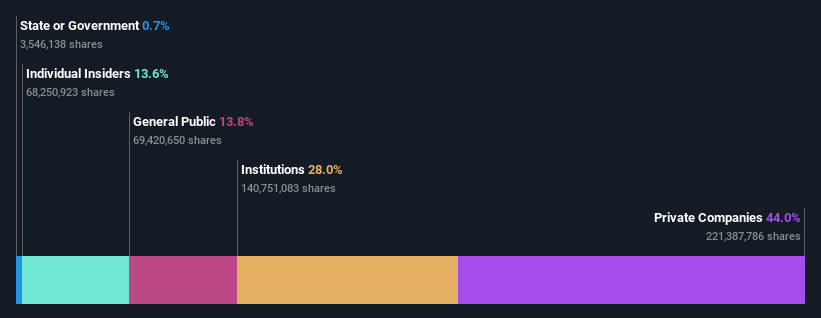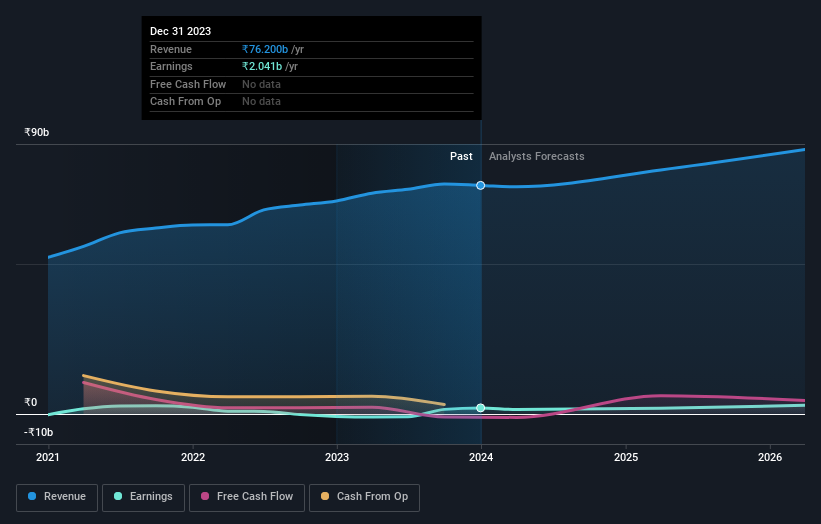Stock Analysis
- India
- /
- Basic Materials
- /
- NSEI:PRSMJOHNSN
Prism Johnson Limited's (NSE:PRSMJOHNSN) market cap dropped ₹5.2b last week; individual investors who hold 44% were hit as were institutions

Key Insights
- Significant control over Prism Johnson by private companies implies that the general public has more power to influence management and governance-related decisions
- 55% of the business is held by the top 2 shareholders
- Insiders own 14% of Prism Johnson
To get a sense of who is truly in control of Prism Johnson Limited (NSE:PRSMJOHNSN), it is important to understand the ownership structure of the business. We can see that private companies own the lion's share in the company with 44% ownership. In other words, the group stands to gain the most (or lose the most) from their investment into the company.
Following a 5.6% decrease in the stock price last week, private companies suffered the most losses, but institutions who own 28% stock also took a hit.
Let's take a closer look to see what the different types of shareholders can tell us about Prism Johnson.
View our latest analysis for Prism Johnson

What Does The Institutional Ownership Tell Us About Prism Johnson?
Many institutions measure their performance against an index that approximates the local market. So they usually pay more attention to companies that are included in major indices.
Prism Johnson already has institutions on the share registry. Indeed, they own a respectable stake in the company. This can indicate that the company has a certain degree of credibility in the investment community. However, it is best to be wary of relying on the supposed validation that comes with institutional investors. They too, get it wrong sometimes. When multiple institutions own a stock, there's always a risk that they are in a 'crowded trade'. When such a trade goes wrong, multiple parties may compete to sell stock fast. This risk is higher in a company without a history of growth. You can see Prism Johnson's historic earnings and revenue below, but keep in mind there's always more to the story.

Hedge funds don't have many shares in Prism Johnson. The company's largest shareholder is Hathway Investments Pvt. Ltd., with ownership of 38%. For context, the second largest shareholder holds about 17% of the shares outstanding, followed by an ownership of 12% by the third-largest shareholder. Rajan Raheja, who is the third-largest shareholder, also happens to hold the title of Member of the Board of Directors.
A more detailed study of the shareholder registry showed us that 2 of the top shareholders have a considerable amount of ownership in the company, via their 55% stake.
Researching institutional ownership is a good way to gauge and filter a stock's expected performance. The same can be achieved by studying analyst sentiments. There are plenty of analysts covering the stock, so it might be worth seeing what they are forecasting, too.
Insider Ownership Of Prism Johnson
The definition of company insiders can be subjective and does vary between jurisdictions. Our data reflects individual insiders, capturing board members at the very least. The company management answer to the board and the latter should represent the interests of shareholders. Notably, sometimes top-level managers are on the board themselves.
I generally consider insider ownership to be a good thing. However, on some occasions it makes it more difficult for other shareholders to hold the board accountable for decisions.
Our most recent data indicates that insiders own a reasonable proportion of Prism Johnson Limited. It is very interesting to see that insiders have a meaningful ₹12b stake in this ₹88b business. Most would be pleased to see the board is investing alongside them. You may wish to access this free chart showing recent trading by insiders.
General Public Ownership
The general public-- including retail investors -- own 14% stake in the company, and hence can't easily be ignored. While this size of ownership may not be enough to sway a policy decision in their favour, they can still make a collective impact on company policies.
Private Company Ownership
Our data indicates that Private Companies hold 44%, of the company's shares. It's hard to draw any conclusions from this fact alone, so its worth looking into who owns those private companies. Sometimes insiders or other related parties have an interest in shares in a public company through a separate private company.
Next Steps:
I find it very interesting to look at who exactly owns a company. But to truly gain insight, we need to consider other information, too. For instance, we've identified 2 warning signs for Prism Johnson (1 is potentially serious) that you should be aware of.
If you would prefer discover what analysts are predicting in terms of future growth, do not miss this free report on analyst forecasts.
NB: Figures in this article are calculated using data from the last twelve months, which refer to the 12-month period ending on the last date of the month the financial statement is dated. This may not be consistent with full year annual report figures.
Valuation is complex, but we're helping make it simple.
Find out whether Prism Johnson is potentially over or undervalued by checking out our comprehensive analysis, which includes fair value estimates, risks and warnings, dividends, insider transactions and financial health.
View the Free AnalysisHave feedback on this article? Concerned about the content? Get in touch with us directly. Alternatively, email editorial-team (at) simplywallst.com.
This article by Simply Wall St is general in nature. We provide commentary based on historical data and analyst forecasts only using an unbiased methodology and our articles are not intended to be financial advice. It does not constitute a recommendation to buy or sell any stock, and does not take account of your objectives, or your financial situation. We aim to bring you long-term focused analysis driven by fundamental data. Note that our analysis may not factor in the latest price-sensitive company announcements or qualitative material. Simply Wall St has no position in any stocks mentioned.
About NSEI:PRSMJOHNSN
Prism Johnson
Prism Johnson Limited, an integrated building materials company, provides cement, ready-mixed concrete, tiles, sanitaryware, and bath fittings in India and internationally.
Moderate growth potential with mediocre balance sheet.

